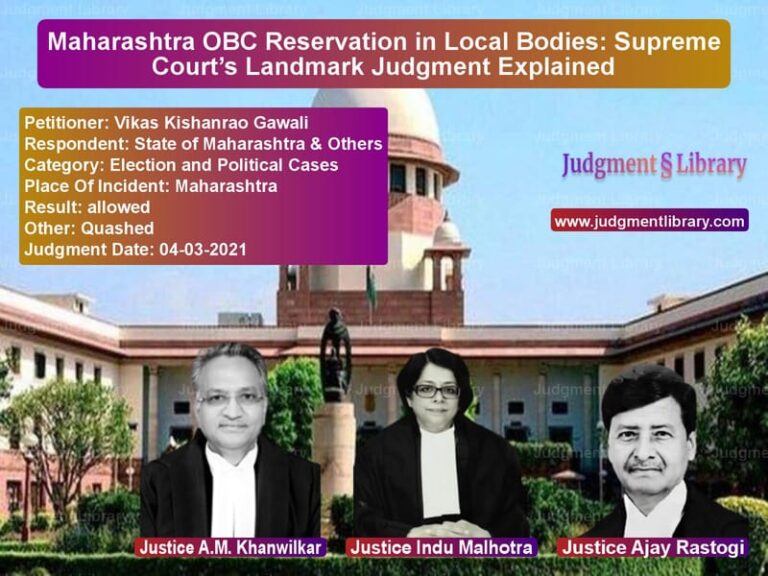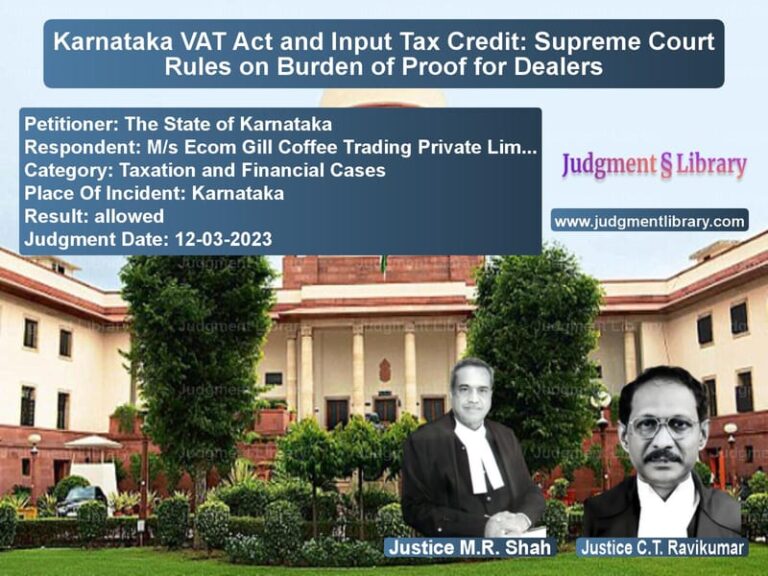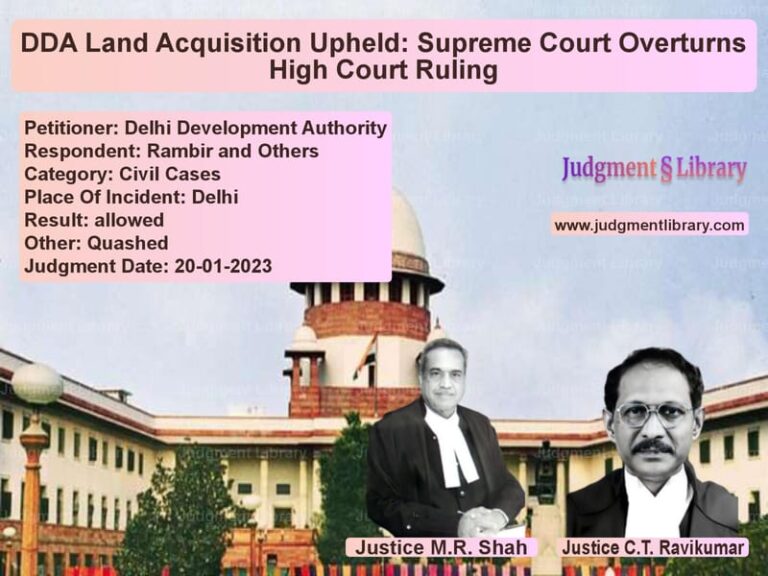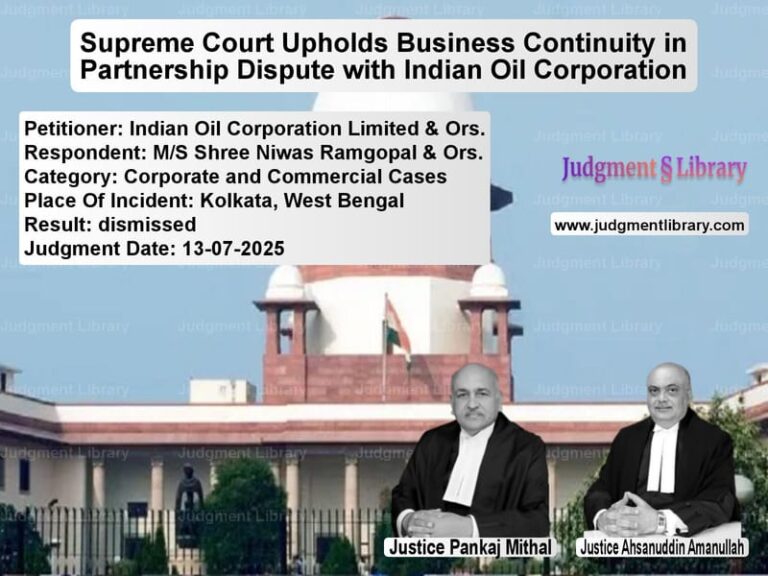Murder Conviction Upheld: Supreme Court Rejects Appeal in 1993 Bihar Murder Case
The case of Prabhash Kumar Singh vs. The State of Bihar (Now Jharkhand) revolves around the conviction of the appellant for the murder of Ashok Rewani on January 22, 1993. The Supreme Court, in its judgment on September 12, 2019, dismissed the appeal and upheld the conviction and life sentence imposed by the trial court and later confirmed by the Jharkhand High Court.
Background of the Case
The incident took place at Mahuwar Chawk, Bokaro District, within the jurisdiction of Harla Police Station, around 10 PM. The case was initiated based on a Fardbeyan (statement) recorded by the victim’s relative, Nun Chand Rewani (P.W.3), at Bokaro General Hospital, where the victim had been taken for medical treatment after the shooting.
The prosecution’s version, accepted by the trial court and later by the High Court, was that the deceased had gone to Mahuwar Chawk on a two-wheeler to have tea along with Nun Chand Rewani (P.W.3) and Rupesh Kumar Rewani (P.W.1), his nephew. While at the tea stall, the second appellant (who later passed away) arrived and started abusing the victim. Upon the victim’s protest, the surviving appellant, Prabhash Kumar Singh, was called to the scene and was instigated to kill the deceased. In response, the appellant took out a pistol and shot the victim in the chest. The victim collapsed, and as the appellant fled the scene, he fired another shot.
Legal Issues and Arguments
Arguments by the Appellant (Prabhash Kumar Singh):
- The medical evidence did not conclusively establish that the victim was killed due to a gunshot fired by him.
- There was no charring on the deceased’s body, which would have been present if the shooting had occurred from close range.
- No bullet was recovered from the body, and there was no forensic evidence linking the alleged firearm to the crime.
- The visibility at the scene of the crime was poor, and the eyewitnesses could not have accurately identified the assailant.
- The prosecution failed to prove the time of death, as undigested food was found in the deceased’s stomach.
- The deceased had personal conflicts, including a relationship with a girl from an indigenous tribe, which could have led to an alternative motive for the killing.
Arguments by the Respondent (State of Bihar, Now Jharkhand):
- The prosecution presented three eyewitnesses (P.W.1, P.W.2, and P.W.3) who consistently identified the appellant as the shooter.
- The victim’s cause of death was confirmed by the autopsy report, which identified gunshot wounds as the primary cause of hemorrhage and shock.
- Although no bullet was recovered, the medical evidence clearly supported the prosecution’s version.
- The crime took place in a commercial area with two tea stalls nearby, ensuring adequate visibility at the time of the incident.
- The defense’s claim of an alternative motive was unsupported by any evidence.
Supreme Court’s Observations
The Supreme Court ruled in favor of upholding the conviction, stating:
“The burden of proof in criminal trials lies on the prosecution, but when there are clear eyewitness accounts, medical evidence supporting the cause of death, and motive established, the accused cannot evade conviction merely due to non-recovery of the weapon.”
On the issue of medical evidence, the Court noted:
“The absence of an exit wound does not negate the presence of a gunshot injury. The medical report corroborates the prosecution’s case that the injury was caused by a bullet fired from a firearm.”
Regarding the time of death, the Court relied on Modi’s Medical Jurisprudence and held:
“Digestion can continue for a significant period after death, particularly in young and healthy individuals. The presence of undigested food does not automatically disprove the prosecution’s case.”
The Court also dismissed the appellant’s claim that visibility was insufficient to identify the shooter, noting:
“The murder occurred in a city area with active tea stalls, where artificial lighting was present. The eyewitnesses knew the appellant personally, and their testimonies were consistent.”
Key Rulings and Conclusion
The Supreme Court rejected the appellant’s plea and upheld the High Court’s ruling, confirming the conviction under Section 302 IPC and life imprisonment. The key rulings included:
- The prosecution successfully proved its case beyond a reasonable doubt.
- The testimonies of the eyewitnesses were consistent and credible.
- The medical evidence, despite the absence of a recovered bullet, was sufficient to support the conviction.
- The appellant’s alternative motive theory was unsupported by any credible evidence.
- The appellant was directed to surrender within four weeks, failing which the trial court was instructed to take necessary steps to ensure he undergoes the sentence.
This judgment underscores the importance of eyewitness testimony in criminal cases and reaffirms that minor discrepancies in medical evidence cannot override clear, direct evidence of a crime.
Petitioner Name: Prabhash Kumar Singh.Respondent Name: The State of Bihar (Now Jharkhand).Judgment By: Justice Deepak Gupta, Justice Aniruddha Bose.Place Of Incident: Bokaro, Jharkhand.Judgment Date: 12-09-2019.
Don’t miss out on the full details! Download the complete judgment in PDF format below and gain valuable insights instantly!
Download Judgment: Prabhash Kumar Singh vs The State of Bihar ( Supreme Court of India Judgment Dated 12-09-2019.pdf
Direct Downlaod Judgment: Direct downlaod this Judgment
See all petitions in Murder Cases
See all petitions in Bail and Anticipatory Bail
See all petitions in Judgment by Deepak Gupta
See all petitions in Judgment by Aniruddha Bose
See all petitions in dismissed
See all petitions in supreme court of India judgments September 2019
See all petitions in 2019 judgments
See all posts in Criminal Cases Category
See all allowed petitions in Criminal Cases Category
See all Dismissed petitions in Criminal Cases Category
See all partially allowed petitions in Criminal Cases Category







